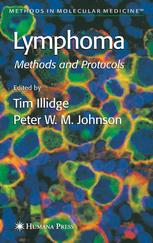

Most ebook files are in PDF format, so you can easily read them using various software such as Foxit Reader or directly on the Google Chrome browser.
Some ebook files are released by publishers in other formats such as .awz, .mobi, .epub, .fb2, etc. You may need to install specific software to read these formats on mobile/PC, such as Calibre.
Please read the tutorial at this link: https://ebookbell.com/faq
We offer FREE conversion to the popular formats you request; however, this may take some time. Therefore, right after payment, please email us, and we will try to provide the service as quickly as possible.
For some exceptional file formats or broken links (if any), please refrain from opening any disputes. Instead, email us first, and we will try to assist within a maximum of 6 hours.
EbookBell Team

4.8
94 reviewsThe tremendous progress made over the last few years in our molecular understanding of lymphocyte biology and lymphoma classification promises to have a major impact on clinical practice. In Lymphoma: Methods and Protocols, leading clinical investigators from world renowned laboratories describe in step-by-step detail the latest molecular techniques being used to better understand, classify, and treat lymphoma. Among the highlights are methods to use immunoglobulin gene rearrangements as markers of clonality, to exploit patterns of somatic mutation in the variable regions to indicate at which stage transformation occurred, and to apply gene arrays to the question of biological heterogeneity in morphologically similar diseases. Research methodologies that are highly likely to become routine practice in the future, such as DNA microarray and immunoglobulin V-gene rearrangements, and measurement of minimal disease, are included. There are also molecular techniques for producing novel therapeutics, such as a DNA vaccine with patient-specific sequences derived from the lymphoma in question. The protocols follow the successful Methods in Molecular Medicine™ series format, each offering step-by-step laboratory instructions, an introduction outlining the principle behind the technique, lists of the necessary equipment and reagents, and tips on troubleshooting and avoiding known pitfalls.
Cutting-edge and highly practical, Lymphoma: Methods and Protocols offers oncologists, hematologists, and clinical scientists a diverse collection of readily reproducible techniques for the molecular diagnosis and prognostic evaluation of lymphomas.